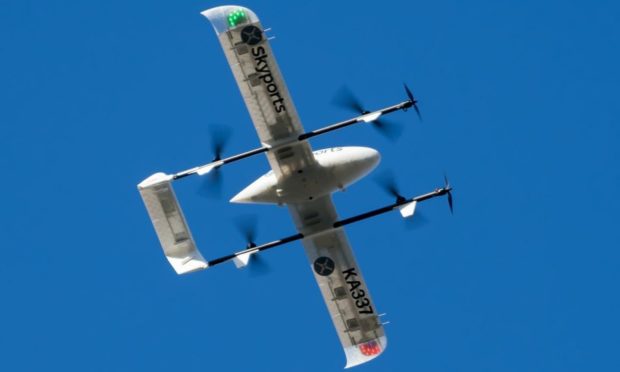Drones could soon be used to deliver lifesaving medical supplies after a successful trial in the Highlands.
The fleet of drones took to the skies to bring coronavirus tests and samples, medicines and other medical equipment to practices in Argyll and Bute.
That cut down average transport time from 21 hours to just 60 minutes – easing the pressure on the NHS in rural areas.
It proved so successful that the a permanent delivery programme could be rolled out by early next year.
Huge potential
Alex Brown, head of operations at air mobility company Skyports – which worked with NHS Scotland for the scheme – said: “During the project, our drones flew over 14,000km (8,700 miles) beyond the visual line of sight, saving over 11,000 hours in time spent waiting for samples.
“This demonstrates the reliability and robustness of our service, and the huge potential it has to improve healthcare outcomes in remote communities.
“With the support of ESA and the UK Space Agency, we look forward to further developing our technology to create a service that is commercially available within the next year.”
The project was supported by the European Space Agency and the UK Space Agency, in partnership with the Argyll and Bute Health and Social Care Partnership (HSCP).
An online booking system developed by Deloitte made it possible for NHS staff to quickly request pick-ups.
‘Improve services for patients’
Stephen Whiston, head of strategic planning, performance and technology at Argyll and Bute Health and Social Care Partnership, said: “We are delighted to be at the forefront of using this innovative technology to demonstrate how unmanned drones can enhance logistics operations and improve services for patients and clinicians in some of our most remote and island communities.
“Removing distance as a barrier to obtain faster results improved the quality and speed of service to patients, it also supported our doctors and nurses by providing faster results to aid and inform their decisions on care and treatment of their patients in our hospitals.”
Emily Gravestock, head of applications strategy at the UK Space Agency, said the project was an example of how the space industry has worked to overcome the challenges of the pandemic.
Her thoughts were echoed by Arnaud Runge, ESA medical engineer and technical officer for the Skyports project, who said: “This project provides more evidence of the fantastic potential space has for the health sector.
“Being also a commercial pilot, I am well aware of the challenges and regulatory implications of sharing a common airspace between drones and other aircraft.
“This makes the project achievements from Skyports even more impressive and it opens the door to a new range of medical drone-based services.”
Skysports was also part of a trial using drones to deliver Covid tests to the Isle of Scilly with Royal Mail.
Last year, Aberdeen medical student Sophie Barrack built a drone that could deliver lifesaving equipment to injured hillwalkers. After consulting with experts, she is now testing whether it could carry the emergency medication and equipment.
